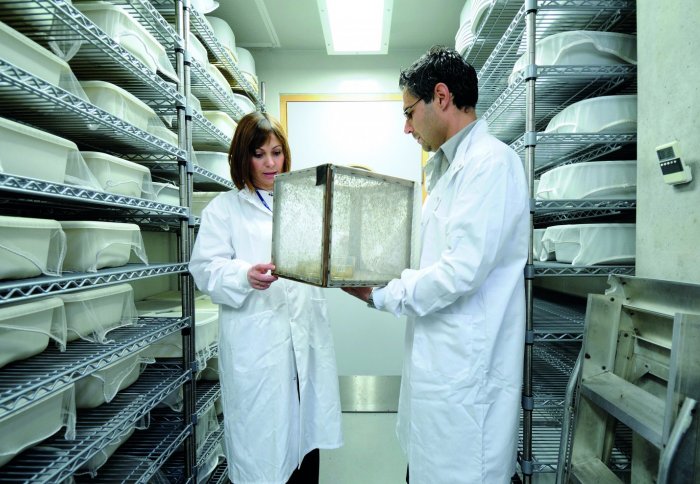Behind the Scenes: Imperial's mosquito laboratories
by Simon Levey

Imperial's labs are home to tens of thousands of mosquitoes specially bred to help understand and prevent the spread of devastating diseases.
1 TAMING THE BEASTS
With over 300 million people affected by malaria every year and no immediate prospects of a vaccine, scientists keenly seek new ways to tackle this disease, which is transmitted by the bites of the female Anopheles mosquito. Around 50 Department of Life Sciences staff are dedicated to breeding mosquitoes and analysing their interactions with the malaria parasite Plasmodium in labs in the Sir Alexander Fleming Building. Mosquitoes are kept at a tropical 80 per cent humidity and 28°C, similar to conditions in their natural habitats in Africa, India and Asia.
2 Life in the lab
Mosquito eggs hatch in their hundreds in large white trays partially filled with salted water. Just one millimetre long, the swimming larvae feed on algae and bacteria, growing to eight millimetres in one week before forming a chrysalis and emerging as adults after another week. The flying insects are then transferred to meshed cages, like the one held here by Dr Dina Vlachou and Professor George Christophides, where they feed on infected animal or human blood sucked through a membrane that mimics real skin. Imperial’s researchers are particularly interested in adult mosquitoes; research indicates the spread of malaria can be halted most effectively at this stage.
3 FIGHTING FEVER
Imperial has long been at the forefront of efforts to halt malaria. Over a decade ago Professor Andrea Crisanti bred the first transgenic Anopheles mosquitoes. Now researchers aim to stop the disease by creating mosquitoes genetically immune to Plasmodium, blocking its transmission to humans, or suppressing the insect populations by creating sterile males. Their work is funded by the Wellcome Trust and Bill and Melinda Gates Foundation, among others. Professor Christophides coordinates a European Union-backed study in sub-Saharan Africa, where scientists are testing how malaria parasites and their mosquito carriers react to potential vaccines and drugs.
Photo credit: Jo Meszkowski
This article first appeared in Imperial Magazine, Issue 37. You can view and download a whole copy of the magazine, from www.imperial.ac.uk/imperialmagazine.
Article text (excluding photos or graphics) © Imperial College London.
Photos and graphics subject to third party copyright used with permission or © Imperial College London.
Reporter
Simon Levey
Communications Division